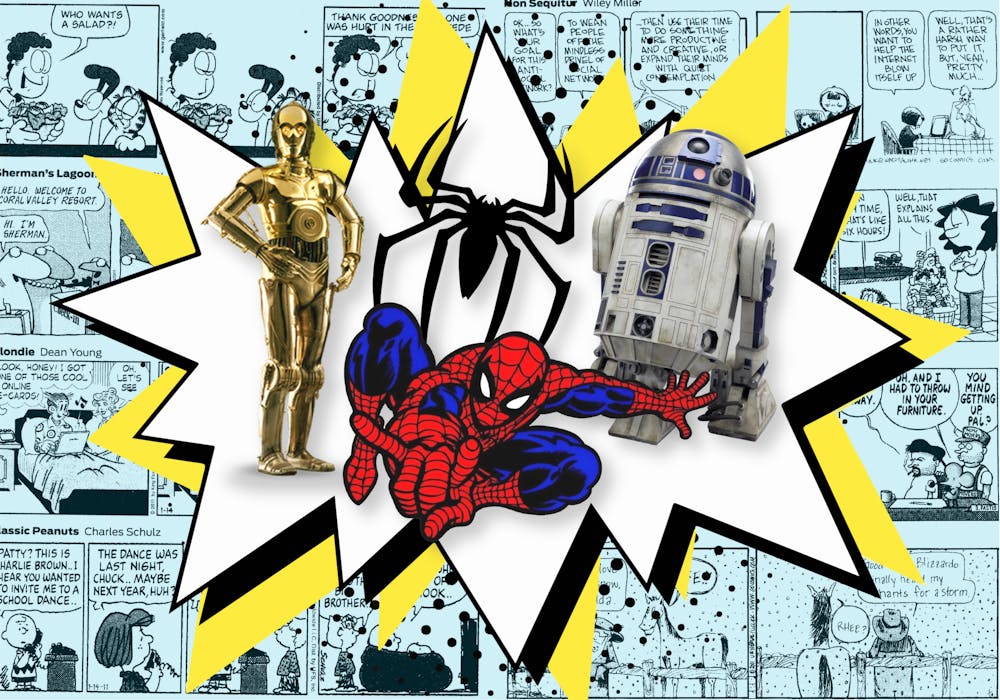Let’s face it, science fiction just doesn’t hit with the same weight that it used to.
From Phase 4 of the Marvel Cinematic Universe to Denis Villeneuve’s “Dune” series, sci-fi has been approaching the craft with a different set of ideals.
Sci-fi has recently felt as if it’s been trying to push an entire universe onto its viewers, either with a complex web of releases that require all viewers to watch every release or with an overly intricate world where political analogies turn into the entire film.
Marvel’s newest phase has hit epic levels of confusion and fatigue. With too many releases, fans no longer want to keep up with the MCU with the same force as keeping up with the news.
Marvel has been releasing garbage content that has pushed some of its most dedicated fans into exhaustion. “Ant-Man: Quantumania” was a laughable mess trying its best to seem like a goofy 1980s movie. “Secret Invasion” was just laughable.
“Dune” and “Dune: Part Two” were great films, but aimed to build poignant political analogies and forgot, at times, what made sci-fi thrilling. Ultimately, this series can feel like an epic as intense as “Killers of the Flower Moon,” but ends up becoming tiring.
These films are turning into movie adaptations of the game “Second Life.”
Some of my favorite sci-fi movies, “The Empire Strikes Back,” “Close Encounters of the Third Kind,” and the Sam Raimi “Spider-Man” trilogy knew what to aim for.
Effective sci-fi aims to instill wonder into the viewer, not just another venue for fears about the state of global politics. “Star Wars” effectively crafts a rebellion drama reminiscent of both World War II and the Vietnam War, but doesn’t overwhelm with intricacy.
The original trilogy, and “The Empire Strikes Back,” particularly, weave a lot of humor into the picture and a remarkably memorable cast of characters.
The biggest failure, upon my viewing, of “Dune: Part Two” was its failure to remember that children are a major market for sci-fi. Stilgar (Javier Bardem) is the easy favorite in this movie, with his character acting as a Paul Atreides (Timothée Chalamet) fan-boy.
Stilgar didn’t have that many comedic moments, but when he did, they instantly became my favorite parts. Plus, it’s worth mentioning the plethora of memes on X (formerly Twitter) aimed almost exclusively at Stilgar’s fan-boying.
Enjoy what you're reading?
Signup for our newsletter
Further, the “Dune” series fails to use a palette of colors that’s anything more than monotonously boring. While I don’t want all sci-fi to be aimed at children, it should be remembered who connects best with otherworldly universes.
“Return of the Jedi” found a way to include Vietnam War-like sequences without bogging down the story with analogies. There are sympathetic characters the viewer falls in love with — sometimes almost literally.
The Raimi “Spider-Man” trilogy almost completely revolves, in some manner, around the phrase “With great power comes great responsibility.” It’s these simple, yet important, themes that propel sci-fi to be great.
Childlike wonder and amusement are the greatest driving forces when it comes to success in this genre. While Villeneuve with the “Dune” series clearly shows his stature as a skilled filmmaker, the film misses a certain element of simple-to-grasp beauty.
The newest MCU films, “Dune” and “The Creator,” all take themselves far, far too seriously in trying to build a realistic other-world when they should aim to create a world that imbues awe into the viewer, drawing them deeper into the story as a byproduct.
When I watch the old “Spider-Man” films or “Star Wars,” I’m struck by nostalgia in a basic sense, sure, but more by the way my mind views it as if I were still a child.
I remember C-3PO, R2-D2 and imperialist themes before I remember Stilgar and the complexity woven into “Dune.” I remember the coming-of-age and redemption arcs in “Spider-Man” before I remember the power struggle between the Bene Gesserit and the Emperor in “Dune: Part Two.”
Complex themes don’t require an abundance of complex, intricately woven narratives. Good sci-fi benefits when it remembers it should be wonderful before it should be great.
When I kick back to watch a sci-fi movie, I want to feel that I can be a part of a great, different universe. I don’t want to be slammed with convoluted storylines.
I want sci-fi to make me feel like a kid again.




